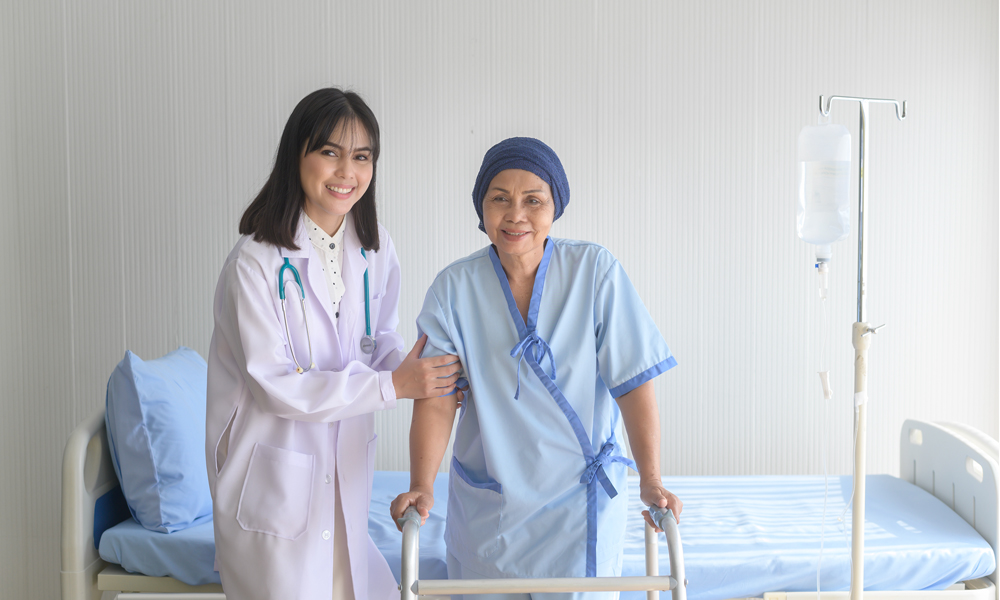-
 Toll Free No 9146-744-744
Toll Free No 9146-744-744 - Appointment
A way to treat cancer using intensive drugs to kill fast-growing cancer cells is called Chemotherapy or Chemo in simple language. It is often used to treat cancer since cancer cells grow and multiply quickly. It may get paired with other cancer treatments such as radiation therapy or surgery. Chemo is given intravenously (through a vein).
Tough it an effective treatment to treat many types of cancer, the treatment carries a risk of side effects. Unlike radiation or surgery that targets specific areas, chemo can work throughout the body affecting some fast-growing healthy cells like those of skin, hair, intestines, and bone marrow causing serious side effects like severe hair fall, etc
Cancer cells grow uncontrollably in the body. Chemo helps destroy the cells and prevents them from multiplying. The treatment is used in different ways:
Cancer that has not spread to other areas of the body
Cancer that has spread to other areas of the body
The types of chemo patients receive depend on:

A doctor removes cancerous tumors or tissue, or organs contaminated with cancerous cells.
An expert uses invisible radioactive particles to kill cancer cells. The radioactive material is bombarded onto parts of the body using a special machine from outside.
Living material in the form of bacteria, vaccines, or antibodies is carefully introduced into the body to kill cancer cells.
Below is given a list of treatments of how chemotherapy is given to patients.
The drugs are delivered with a shot directly into muscle in your hip, thigh, or arm, or in the fatty part of your arm, leg, or stomach, just beneath the skin.
The drugs go directly into the artery that supplies blood to the cancer cells, through a needle, or soft, thin tube (catheter).
The drugs are delivered to the peritoneal cavity, which contains organs such as your liver, intestines, stomach, and ovaries
This goes into the area between the brain and spinal cord.
The chemotherapy goes directly into a vein.
The patient rubs the drugs in a cream form onto the skin.
The patient swallows a pill or liquid that has the drugs.


Apart from potential side effects, chemo has been effective, reliable cancer treatment. It may cure or can help reduce cancer symptoms. Chemotherapy also makes other treatments such as surgery or radiation therapy more effective.
Chemotherapy is not a painful treatment, however, the side effects of the chemotherapy drugs can be physically and emotionally challenging.
The rest period varies from patient to patient body responses. Usually, the rest period is typically 2 to 3 weeks, but it can be shorter or longer.
After chemotherapy, radiation therapy, or surgery, an extra protein diet is needed to heal the tissues and help fight infection. Good sources of protein include fish, eggs, low-fat dairy products, nuts, dried beans, peas, lentils, and fresh veggies.
People who receive chemo experience fatigue due to anemia caused by the chemotherapy. Planning daily activities, taking proper rest, and intake of a healthy diet can treat anemia effectively.
That depends on:
Chemotherapy may cause painful side effects like burning, numbness and tingling or shooting pains in your hands and feet, as well as mouth sores, headaches, muscle and stomach pain.
The specific treatment plan that your doctor has advised for you will determine the length and frequency of your chemotherapy treatments. Others might only take half an hour, while some can last up to three or four hours.
Many insurance companies provide coverage for Chemotherapy after a period of few years. Our HospiOne Team can guide you perfectly in this scenario.
OUR PROCESS IS EASY contact us for More information.
Copyright © 2023 hospione.com - All Rights Reserved | Developed by Digital Marketing StudioGenix LLP